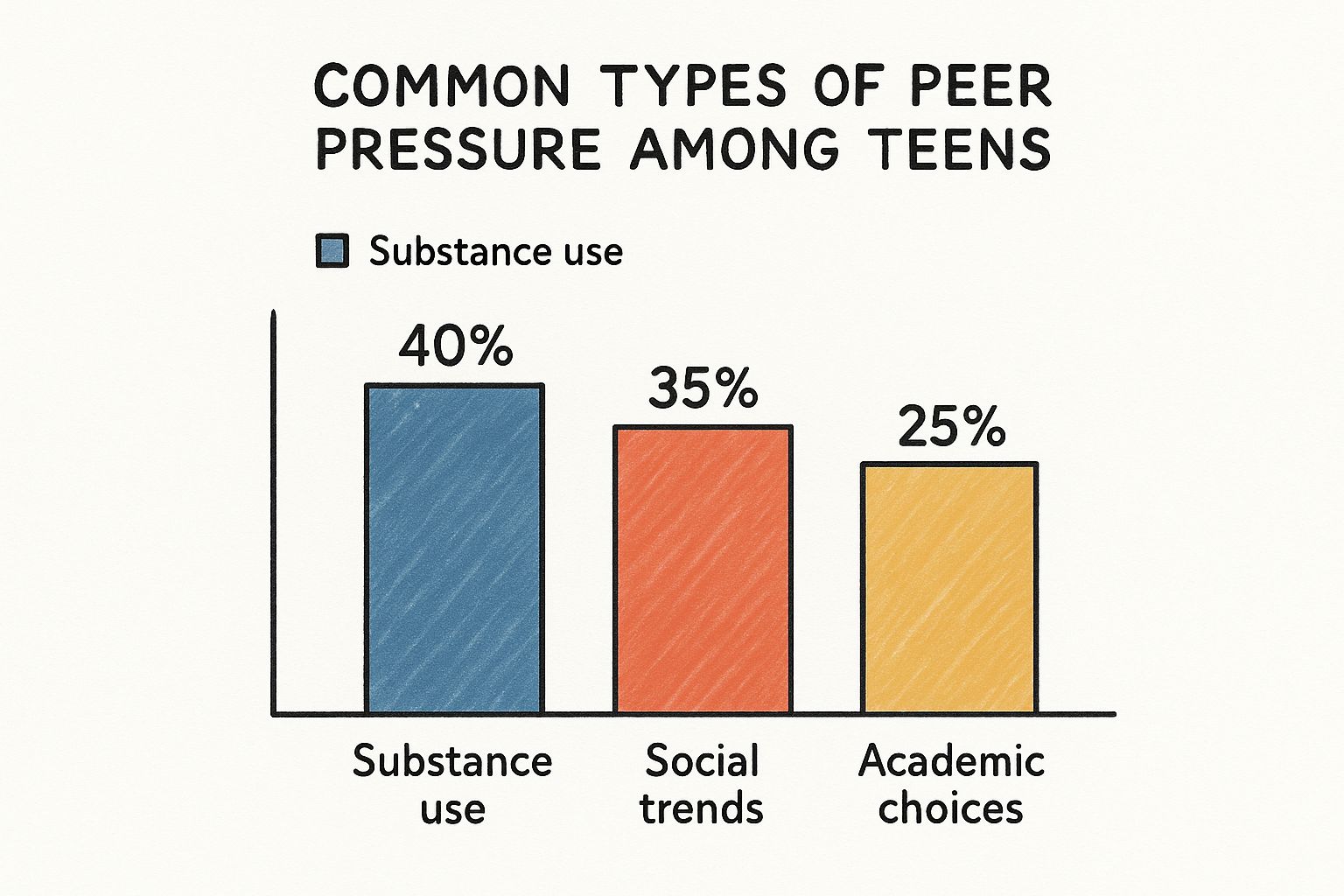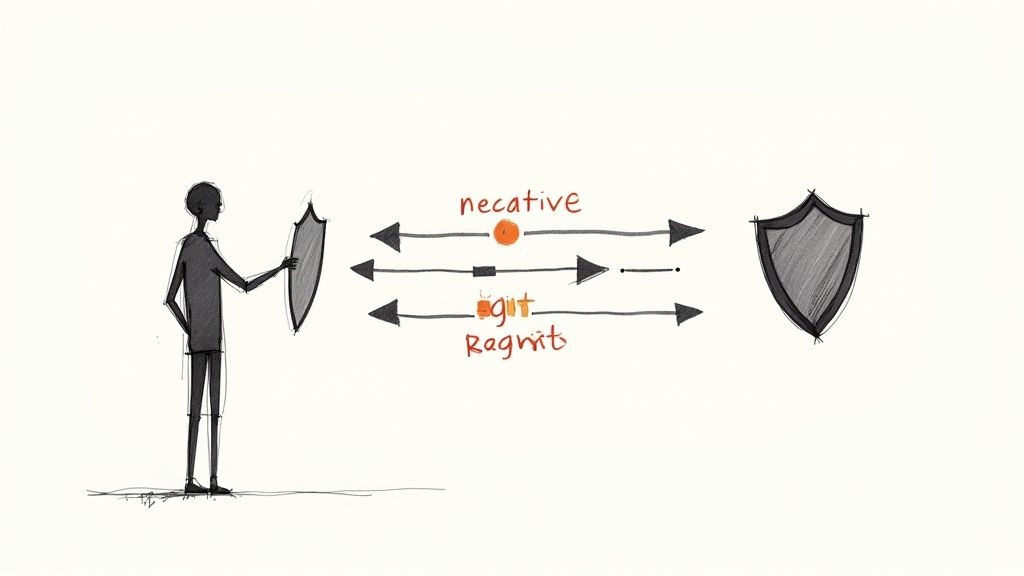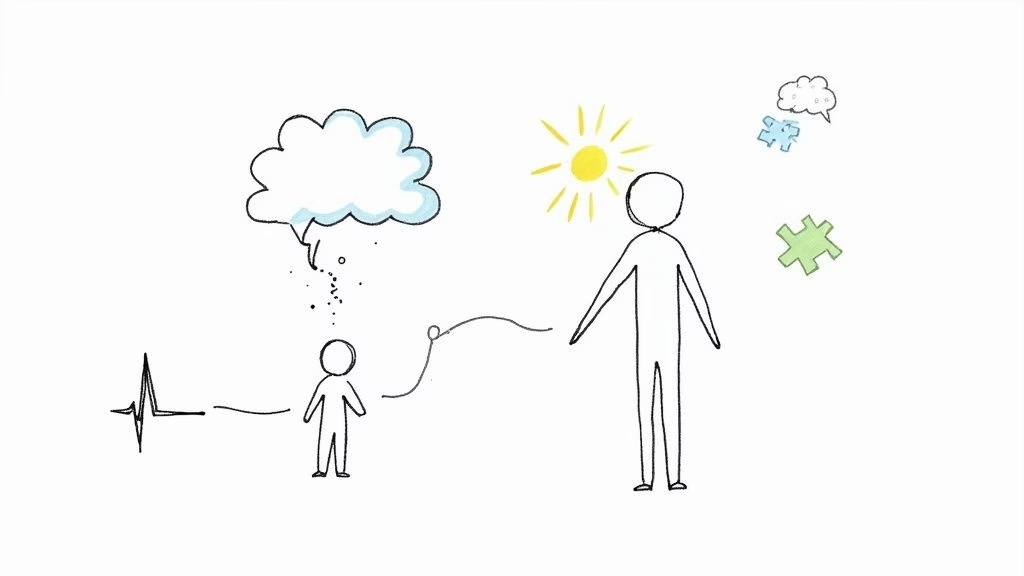Dealing with peer pressure isn't about dramatic standoffs or saying "no" to a dare. It’s much quieter than that. The real work is learning to recognize the subtle nudges and pulls you feel in social situations, especially online, and building the self-awareness to navigate them with confidence.
The goal isn't to react emotionally—it's to respond thoughtfully. And that starts with understanding what you're up against.
What Peer Pressure Actually Looks Like Today
Let's get one thing straight: the old-school image of a group of kids pushing someone to do something obviously risky is mostly a relic of after-school specials. Today's peer pressure is a constant, low-humming undercurrent. It’s that little voice pushing you to keep up with social trends, meet certain academic expectations, or just fall in line with what everyone else is doing.
It’s not always a bad thing, either. A friend bugging you to study for a big test is technically peer pressure, but it's the positive kind. The negative side, however, is what leaves you feeling anxious and questioning your own values.
This pressure gets amplified a thousand times over in the digital world. Social media has created a 24/7 arena for comparison and the dreaded fear of missing out (FOMO). A revealing Pew Research Center study on social media and teen mental health found that 46% of US teens feel intense pressure from what they see online. This constant connectivity has turned peer pressure from a situational challenge into a relentless one.
Recognizing Different Types of Peer Pressure
To get a handle on peer pressure, you first have to know where it's coming from. It doesn't just show up at parties; it can quietly influence your choices about school, your health, and your friendships. Getting good at spotting it is the first real step toward managing it.
Here’s a quick breakdown of common peer pressure scenarios to help you identify them in your own life.
| Type of Pressure | What It Looks Like | Real-World Example |
|---|---|---|
| Spoken Pressure | Someone directly asks, suggests, or persuades you to do something. It's obvious and out in the open. | "Just have one drink, everyone else is." |
| Unspoken Pressure | You feel a pull to act a certain way just by watching what others do. No one says a word, but the expectation is clear. | Noticing everyone in your group wears a certain brand of shoes, so you feel you need them too. |
| Direct Pressure | This is usually negative and can feel aggressive. It's a clear attempt to control your actions, often through teasing or reasoning. | "You're not going to that party? Don't be so lame." |
| Indirect Pressure | This is the subtle stuff—seeing posts online that make you feel like you're missing out or aren't cool enough. | Scrolling through Instagram and seeing all your friends at a concert you weren't invited to. |
| Positive Pressure | When friends encourage you to do something that helps you grow or stay on track. | A teammate encouraging you to come to an extra practice session to improve your skills. |
Seeing it laid out like this makes it easier to realize that what you're feeling isn't just in your head. It’s a real, tangible influence.
Where You'll Feel It Most
Now, let's look at the big-picture areas where this pressure really shows up. The data below breaks down the most common types of peer pressure that teens are navigating today.

While pressure around substance use is still a major issue, it's clear that the combination of social and academic pressures impacts the majority of teens. Just knowing these dynamics exist is half the battle. When you can name what you’re feeling, you can start to deal with it on your own terms.
Build Confidence That Can't Be Shaken

Here’s the thing about peer pressure: your best defense isn't some witty comeback or a perfect excuse. It’s a rock-solid sense of who you are. Real confidence is like a shield. When you truly know and respect yourself, the opinions of others just don't hit as hard, making it way easier to stick to your guns when things get tough.
This isn't just about social situations, either. That same self-worth is directly tied to your motivation and how you show up at school. Procrastination? Often, that's just a fear of failure or a quiet feeling of not being good enough. By building your self-esteem, you’re not only learning how to handle peer pressure, you're investing in your own future success.
Mental Health and Support for Young Men
Teen boys often get hit with a unique kind of pressure—the unspoken rule to act tough, keep it all in, and never show emotion. This can make asking for help feel next to impossible. But finding a safe space to talk is crucial.
There are great resources out there like The Jed Foundation and Man Therapy, which offer support specifically for young men navigating mental health. Local men's groups can also provide that feeling of community and understanding you can't get anywhere else.
"True confidence comes from knowing your worth isn't determined by others' approval. It's an internal validation that you are enough, just as you are."
For parents, creating this environment at home is everything. Ditch the lectures and just listen. Encourage open, judgment-free conversations about the pressures your son is facing and validate his feelings. Building that trust now means he’ll be more likely to come to you when he really needs it.
A Simple Meditation for Clarity
When social anxiety or pressure starts to feel overwhelming, a quick mindfulness exercise can pull you back to your center. It's a simple way to quiet the noise in your head and reconnect with yourself. You don't need a special room or cushion—just a few minutes.
- Find a quiet spot where you can sit comfortably and close your eyes.
- Tune into your breath. Just notice the air coming in and going out. Don't try to change it; just observe it.
- Acknowledge your thoughts. When they pop up—and they will—just see them as clouds passing by. Gently guide your focus back to your breath.
- Stay here for 3-5 minutes. When you’re ready, slowly open your eyes.
This simple practice helps you build a stronger inner foundation, one breath at a time. If you want to go deeper on this journey, exploring resources on how to build confidence can give you even more strategies and support.
Your Toolkit for Saying No Gracefully
Knowing you should say no is one thing. Actually saying it in a high-pressure moment? That’s something else entirely. It's tough. The key isn't to invent some perfect, dramatic speech on the spot—it's to have a few strategies ready to go.
This isn’t about creating conflict. It’s about protecting your own peace. Think of it like having a few pre-loaded responses in your back pocket. That way, you can pull out what feels right without fumbling for words. A huge part of this is setting healthy boundaries so you can stay true to yourself.
Real Scripts for Real Scenarios
Let's get practical. A flat "no" can sometimes feel too blunt or confrontational, especially with friends. The good news is, you have other options. Here are a few different approaches you can adapt for almost any situation, whether you're at a party that's getting weird or in a group chat that's turning toxic.
- The "I" Statement: This is my go-to. It’s all about owning your feelings without pointing fingers. Instead of saying, "You guys are being idiots," you can just say, "Nah, I'm not really feeling this right now." It’s almost impossible for someone to argue with how you feel.
- Suggest an Alternative: This is a great way to redirect the energy. It shifts the focus from what you won't do to something positive you could do. If your friends want to skip class, try something like, "I can't miss that review, but let's grab pizza right after school."
- The Simple Exit: You don't always owe anyone a long explanation. A simple, "Hey, I've gotta run, I'll catch you later," is a completely valid way to remove yourself from a situation that doesn’t feel right. No drama needed.
- Use a Reason (The Classic): Sometimes a straightforward reason is the cleanest way out. "I can't, I have a game early tomorrow," or "My parents would ground me for life." These are classics for a reason—they work, and most people will respect them.
Resisting peer pressure isn’t about being confrontational; it’s about being clear. Your goal is to communicate your boundaries respectfully—a skill that will serve you long after you've graduated.
Figuring out how to do this with friends is a huge piece of the puzzle. For a deeper dive, check out our guide on how to set boundaries with friends.
The real goal here is to find a phrase that feels natural coming out of your mouth. Practice it in your head. The more prepared you feel, the less power the pressure will have over you.
Find Your People and Build a Support System

You’re not meant to navigate this stuff alone. Seriously. Trying to handle every social pressure that comes your way by yourself is a recipe for burnout. The absolute best defense you have against negative influences is a solid support system—people who genuinely have your back.
This isn’t about being the most popular kid in school. It's about finding real friends who respect your decisions, even when they're different from their own. These are the people you can turn to when you’re struggling, without having to worry about being judged or made fun of.
Recent findings show just how critical this is. Vital support systems from family and peers have actually been declining since 2018, especially for girls. A WHO Europe report noted a drop in teens reporting high family support from 73% to 67%, and peer support fell from 61% to 58%. That trend is a big deal because it leaves more teens feeling like they have no one to talk to. You can dig into the numbers yourself in WHO's official report.
Parenting Tips for a Stronger Connection
For parents, your most powerful tool is creating a home where your teen feels safe enough to be honest. The goal is to build an environment where they turn to you for guidance, not hide their struggles from you.
- Listen More, Lecture Less: When your teen opens up, fight that urge to jump in with advice or criticism. Just listen. Validate what they're feeling with something simple like, "Wow, that sounds really tough."
- Share Your Own Stories: Remember that time you faced peer pressure? Talk about it. Sharing your own screw-ups and vulnerable moments makes you more relatable and shows them that everyone goes through this.
- Build Resilience Together: Instead of solving their problems for them, ask questions that get them thinking. "What do you think you could do in that situation?" This builds their confidence and teaches them how to make their own good decisions.
The strongest defense a teen has against peer pressure isn't a set of rules—it's the unwavering knowledge that they have a safe harbor at home where they can be completely themselves.
For Teen Boys and Young Men
For guys, the pressure to "man up" and just deal with things silently is intense. It's exhausting. Finding a group where you can finally drop that act is a total game-changer. Look for clubs, teams, or even online communities built around stuff you're actually into.
Groups like The Man Cave or EVRYMAN are creating spaces where young men can connect without the usual posturing. These aren't stuffy therapy sessions; they're communities where guys can talk openly about school, motivation, and life's pressures without judgment. Building these connections is a powerful way to handle peer pressure because you quickly realize you're not the only one feeling it.
Mental Health Resources for When It Gets Tough

Constantly trying to fit in and manage what everyone else thinks is completely draining. It's okay to admit that it takes a toll.
If you find yourself losing motivation for school or putting things off constantly, it might be a sign that the mental load has become too heavy. This isn't just you—this kind of stress is a huge factor in the youth mental health crisis. In fact, nearly 40% of high school students report feeling persistently sad.
Reaching out when you're struggling isn't a weakness; it's one of the strongest things you can do. For teen guys especially, it can be tough to find a place to talk openly without feeling judged. Resources like The Jed Foundation and various online men’s groups are creating those exact spaces—communities where you can be real about your challenges.
A Simple Meditation to Find Calm
When anxiety hits and your thoughts start racing, this quick meditation can help pull you back to center. Find a quiet spot, get comfortable, and gently close your eyes.
- Just Breathe. For a minute, focus only on your breath. Feel the air come in, and feel it go out. Don’t try to change anything, just notice it.
- Let Thoughts Pass. Your mind is going to wander—that’s what minds do. When thoughts about school, friends, or anything else pop up, just acknowledge them without getting stuck. Then, gently guide your focus back to your breath.
- Give It Two Minutes. That's it. A few minutes can be enough to hit the reset button. When you’re ready, slowly open your eyes.
Taking a moment to connect with your breath is a powerful way to manage stress and regain control when you feel overwhelmed by outside pressures.
Support for Parents and Teens
For parents, the goal is to open up a real dialogue. Encourage your teen to talk about what they're feeling, and just listen without jumping in to solve it all. Sometimes, just having their stress validated makes all the difference.
And for teens, please know that support is always out there. Organizations like the National Alliance on Mental Illness (NAMI) and various crisis hotlines offer confidential help whenever you need it. The pressure can feel isolating, but learning practical skills like how to overcome social anxiety can give you more tools to handle it.
And if you're interested in a more holistic view of well-being, it's fascinating to see how the gut microbiota brain axis influences mental wellness.
Common Questions About Peer Pressure
When you're navigating a tough situation, you need straight answers, not fluff. Let's dig into some of the most common questions teens and parents have about peer pressure and get right to the practical advice.
What If Peer Pressure Is Killing My Motivation for School?
This one is huge, especially for teen guys who feel like they have to play it cool and act like they don’t care about school. It's tough to stay focused when your friends are all about slacking off.
The best way to start is by setting small, personal goals that are just for you. Forget what anyone else thinks. Maybe it's just acing one quiz or knocking out a project a day early. These little wins build momentum and remind you that your success is your own.
And for parents? If you see your teen procrastinating or their motivation dropping, resist the urge to make demands. Instead of, "Why aren't you doing your homework?" try asking, "How are things feeling with your friends at school lately?" That small shift can open the door to a real conversation.
Where Can I Find People Who Actually Get It?
Finding your people is everything. If you're a guy struggling with that unspoken pressure to be tough and silent, connecting with others who understand can be a massive relief.
Here are a few places to start:
- Men's Groups: Organizations like The Man Cave create safe spaces—both online and in-person—where young men can actually talk about what’s going on without feeling judged.
- Mental Health Resources: Websites like The Jed Foundation are geared specifically toward teens, offering mental health resources and research that speak your language.
- A Simple Breather: When it all feels like too much, something as simple as a 2-minute meditation can make a world of difference. Just focusing on your breath is a powerful tool for calming your mind and hitting the reset button.
Remember, reaching out for support isn't a sign of weakness. It's one of the strongest things you can do.
Are you a parent watching your teen struggle with motivation, or a teen trying to find your footing amid school and social pressures? Andrew Petrillo Life Coaching offers personalized, one-on-one coaching to help you build confidence, develop practical skills, and turn challenges into opportunities. Discover how to move forward with clarity and purpose by visiting https://andrewpetrillolifecoaching.com today.



















